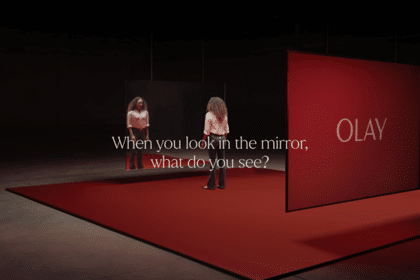As SBS gears up to broadcast the world’s greatest diplomatic endeavour – Eurovision, of course – B&T sat down with Josh Martin, Commissioning Editor for Entertainment and Food.
Eurovision holds a special place in cultural history. It’s the longest running TV broadcast of any kind, ever. It’s older than the European Union. It brought us the disco beats and spangly outfits of Sweden’s greatest export since IKEA meatballs, Bjorn, Benny, Agatha and Anni-Frid.
Last year, it was cancelled due to COVID-19. But now, one year on, the triumphant Dutch will be hosting Euorvision in Rotterdam, and Australia will be there too – sort of.
Australia’s representative Montaigne will be competing, but shooting her shot at glory from home. This year, instead of travelling to the Netherlands, she will be submitting a “live-to-tape” performance of her song ‘Technicolour’ which was filmed in Sydney last month.
Josh Martin, who oversees Eurovision at SBS explain some of the reasoning behind not sending Montaigne to compete in person.
“It was an incredibly difficult decision. We tried to do everything we possibly could to get there and have her perform with everybody else. But the challenges of getting from Australia to Europe in the middle of a global pandemic with a travel ban and reduced flight, and with everything we know, was impossible.”
“Thankfully, the organizers required every country to have a backup live on tape performance this year. We’ve all got very good at contingency measures. So we in this instance, are using that contingency measure. It’s not to say that other countries won’t, I mean, if there were to be a COVID case or in a delegation on the ground there.”
He also thinks Montaigne’s performance will bring something new to the line-up.
“I think Montaigne’s song is quite different to anything Australia has sent before, but also very different to the other songs in the competition. So it will just depend on how that connects with the voting fans.”
Keeping the Eurovision spirit alive while the Australian delegation is at home, and while we are still in the throes of a global pandemic, has presented an unprecedented task.
“It’s more difficult in many ways, because we’re obviously on a completely different time zone,” said Martin.
“We continue to try to engage with the press, and fans over there but from the other side of the world, whereas normally you can walk into a press center or have a chat with a journalist in a hotel. This time, it’s sort of late nights, and weird Zoom hookup meetings, which we’ve all grown to love over the last year.”
“There’s so many different challenges this year, but the one thing I do know is that it is going to be really memorable Eurovision with the most amazing production values, as always, plenty of key changes, plenty of white dresses, plenty of performances.”
Perhaps this year is one where we’ve needed the joy, glamour and campiness of Eurovision more than any.
Martin explained why he feels Eurovision strikes such a chord.
“Eurovision – the whole reason for its existence, started after the Second World War as a way to unite a war-torn Europe. So the very reason for its creation was to bring people together. And certainly as to what we’ve all been through, these 12 to 18 months – that’s more important than ever.”
“So I can see a greater poignancy in Eurovision this year, as a way for 200 million people across Europe, across the world, across Australia to join in a completely joyous, inclusive, diverse, over the top, at times the controversial competition.”
Australia has been competing in Eurovision since 2016, when Dami Im came second with her song ‘Sound of Silence’. Despite not being part of, well, Europe, it is undeniable that the song contestant has an important cultural legacy in Australia too.
“It’s hugely significant for us, not just for SBS, but for Australia as well, for a number of reasons,” Martin said. We’ve been showing it for nearly 40 years and a huge fan base has developed over those over that time. And since we’ve been able to compete, that’s evolved and grown…it allows us to promote SBS values of diversity and inclusion, and culture onto an international stage, which is quite different to a lot of other opportunities.”
He also views it as an opportunity for Australia to share its cultural exports to a unique stage,
“I think, for the local for the Australian music industry, there’s very few, if any other opportunities where you get the chance to have original Australian music promoted to an audience of hundreds of millions of people. And I think that is fantastic for the Australian music industry in general, particularly after the year of lack of tours and shows over the last year. ”
However, when quizzed on his favourite performance, Martin couldn’t single out just one – fair enough, when Eurovision brings a heady combination of pop bangers, traditional folk songs, power ballads, an EDM turkey, operatic vampires, electric guitar playing demons, wrestling werewolves (?) and, of course, ABBA.
“I’m drawn to like the major pop sort of successes, but I’m also really drawn to…like, one year the Ukrainian band called GO_A did a song in their language. It’s just not something you ever come across in Australian music, so I love that sort of cultural [performance].”
“I’m just so excited that the Dutch and the EU have managed to put this together and some of the most extraordinary circumstances. You know, as we start to open up again, it is great to sort of start to see these glimmers of a return to normalcy starting to happen, and I can’t wait.”
This year’s SBS Eurovision coverage will be hosted by Myf Warhurst and Joel Creasey (pictured above with Montaigne). You can catch it on SBS from May 19th to May 23rd.
And who knows, maybe next year, we’ll be hosting the world’s biggest party Down Under…








